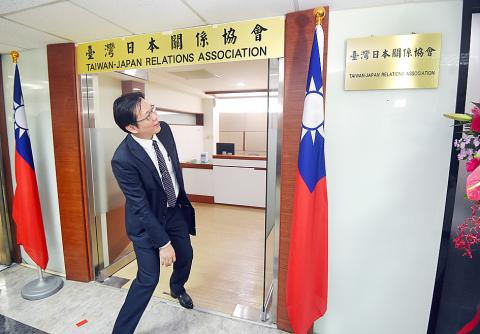Renaming Japan’s representative office in Taipei as the Taiwan-Japan Relations Association would help lessen misunderstandings and reflect Taiwan’s burgeoning relationship with Japan, association president Chiou I-jen (邱義仁) said yesterday at the official unveiling of the association’s new doorplate in Taipei.
“While people were clear about what we were concerned with when the office was first established, as time has gone by, many no longer have a clue,” Chiou said, recalling how he once received a telephone call asking him to resolve an issue in Hawaii.
“Finally” changing the name of the non-governmental agency, formerly known as the Association of East Asian Relations, Taiwan, after almost 45 years lends clarity to the association’s mission, he said.

Photo: Liao Chen-huei, Taipei Times
The association was established in 1972 to handle relations with Japan after diplomatic ties were broken off, with its Tokyo branch — the Taipei Economic and Cultural Representative Office in Japan — also serving as Taiwan’s de facto embassy in the nation.
While officially a civic organization under government contract, most employees simultaneously hold positions at the Ministry of Foreign Affairs.
The name change follows a similar change on the part of its Japanese counterpart earlier this year, which changed its name from Interchange Association, Japan to the Japan-Taiwan Exchange Association.
“Before we changed our name, a lot of people were not clear about our mission — we even had people calling and asking us about marriage matches,” Japan-Taiwan Exchange Association Representative Mikio Numata said, adding that the renaming is a “historic step,” as its name now conforms with reality.
“The name changes not only help the outside world understand the substantial content of both associations’ work — it also verifies the continued positive development of Taiwan-Japanese relations,” Minister of Foreign Affairs David Lee (李大維) said.
Relations have “never been better or more intimate,” he said, citing record-high bilateral trade and tourism.
Any discussion of renaming the Coordination Council for North American Affairs — which handles relations with the US — would have to wait until US President Donald Trump fills key Department of State vacancies, he said.
The ministry’s Japanese Political Affairs director, Fu Kuo-hua (傅國華), said the name changes primarily reflected a shift in Taiwan’s stance.
Japan had proposed using “Taiwan-Japan” to name the associations when official diplomatic ties were first broken off, but the proposal was rejected by Chiang Kai-shek’s (蔣介石) administration, which wanted to use “Chinese-Japanese,” he said.
China yesterday called the name change a “conspiracy” and urged Japan not to send “false signals” to Taiwan and the international community.
“We strongly object to this attempt to upgrade Japanese-Taiwanese relations,” Chinese Ministry of Foreign Affairs spokeswoman Hua Chunying (華春瑩) said. “We urge the Japanese government to scrupulously abide by the principles of the Japan-China Joint Communique, as well as all the promises which Japan has made to China to the present, including holding firm to the ‘one China’ principle.”
“The Japanese government should take concrete action to correct wrong methods and should not send false signals to Taiwan’s government and the international community, creating new interference for Sino-Japanese relations,” she said. “We also want to tell the Taiwanese government that any attempt to create ‘two Chinas’ or ‘one China, one Taiwan’ is doomed to failure.”
Additional reporting by CNA

SECURITY: As China is ‘reshaping’ Hong Kong’s population, Taiwan must raise the eligibility threshold for applications from Hong Kongers, Chiu Chui-cheng said When Hong Kong and Macau citizens apply for residency in Taiwan, it would be under a new category that includes a “national security observation period,” Mainland Affairs Council (MAC) Minister Chiu Chui-cheng (邱垂正) said yesterday. President William Lai (賴清德) on March 13 announced 17 strategies to counter China’s aggression toward Taiwan, including incorporating national security considerations into the review process for residency applications from Hong Kong and Macau citizens. The situation in Hong Kong is constantly changing, Chiu said to media yesterday on the sidelines of the Taipei Technology Run hosted by the Taipei Neihu Technology Park Development Association. With

CARROT AND STICK: While unrelenting in its military threats, China attracted nearly 40,000 Taiwanese to over 400 business events last year Nearly 40,000 Taiwanese last year joined industry events in China, such as conferences and trade fairs, supported by the Chinese government, a study showed yesterday, as Beijing ramps up a charm offensive toward Taipei alongside military pressure. China has long taken a carrot-and-stick approach to Taiwan, threatening it with the prospect of military action while reaching out to those it believes are amenable to Beijing’s point of view. Taiwanese security officials are wary of what they see as Beijing’s influence campaigns to sway public opinion after Taipei and Beijing gradually resumed travel links halted by the COVID-19 pandemic, but the scale of

A US Marine Corps regiment equipped with Naval Strike Missiles (NSM) is set to participate in the upcoming Balikatan 25 exercise in the Luzon Strait, marking the system’s first-ever deployment in the Philippines. US and Philippine officials have separately confirmed that the Navy Marine Expeditionary Ship Interdiction System (NMESIS) — the mobile launch platform for the Naval Strike Missile — would take part in the joint exercise. The missiles are being deployed to “a strategic first island chain chokepoint” in the waters between Taiwan proper and the Philippines, US-based Naval News reported. “The Luzon Strait and Bashi Channel represent a critical access

Pope Francis is be laid to rest on Saturday after lying in state for three days in St Peter’s Basilica, where the faithful are expected to flock to pay their respects to history’s first Latin American pontiff. The cardinals met yesterday in the Vatican’s synod hall to chart the next steps before a conclave begins to choose Francis’ successor, as condolences poured in from around the world. According to current norms, the conclave must begin between May 5 and 10. The cardinals set the funeral for Saturday at 10am in St Peter’s Square, to be celebrated by the dean of the College